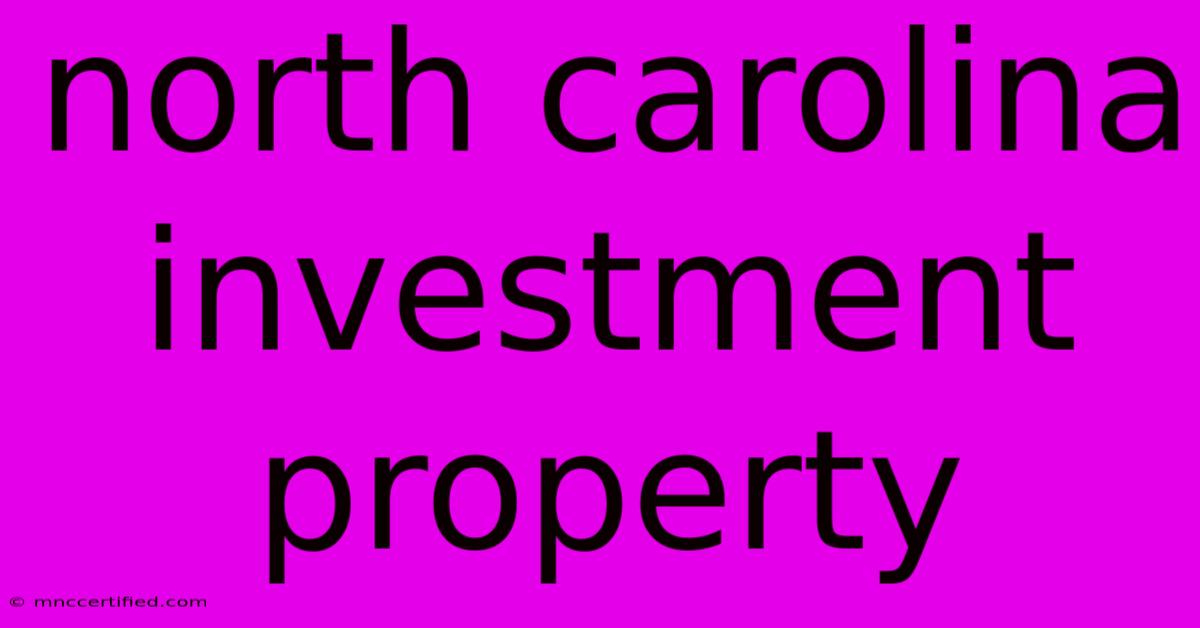North Carolina Investment Property

Table of Contents
North Carolina Investment Property: A Comprehensive Guide for Smart Investors
North Carolina's thriving economy, diverse landscapes, and growing population make it a compelling location for real estate investment. But navigating the North Carolina investment property market requires careful research and strategic planning. This comprehensive guide will equip you with the knowledge you need to make informed decisions and find profitable opportunities.
Why Invest in North Carolina Real Estate?
North Carolina boasts a robust economy with a diverse range of industries, creating a stable and attractive environment for investment. Several factors contribute to its appeal:
-
Strong Job Growth: The state consistently ranks high in job creation, leading to increased demand for housing and rental properties. This translates to higher occupancy rates and rental income for investors. Specific areas like Raleigh, Charlotte, and Durham are particularly strong.
-
Affordable Compared to Other Major Markets: While property values are rising, North Carolina remains relatively more affordable than many other popular investment hotspots on the East Coast, offering a better return on investment (ROI).
-
Variety of Property Types: From single-family homes and condos in bustling cities to vacation rentals in coastal towns and mountain resorts, North Carolina offers diverse investment opportunities to suit various budgets and investment strategies.
-
Favorable Tax Climate: North Carolina's tax structure is generally considered favorable for real estate investors, although it's crucial to consult with a tax professional to understand the implications fully.
-
Growing Population: The state's population continues to grow, further bolstering the demand for housing and rental properties. This ongoing growth ensures long-term stability for your investment.
Types of North Carolina Investment Properties:
Choosing the right property type is key to a successful investment. Consider these options:
-
Single-Family Homes: These offer a solid foundation for rental income and potential appreciation. They are relatively easy to manage and appeal to a broad range of tenants.
-
Multi-Family Homes (Duplexes, Triplexes, Fourplexes): These provide higher rental income potential and economies of scale in management. They can also offer greater diversification of income streams.
-
Condominiums: These offer lower maintenance responsibilities compared to single-family homes, making them attractive to both investors and tenants.
-
Vacation Rentals: Coastal areas and mountain resorts provide opportunities for short-term rentals, which can generate substantial income, particularly during peak seasons. However, managing vacation rentals requires more hands-on involvement.
Finding the Right North Carolina Investment Property:
-
Market Research: Thorough market research is crucial. Analyze rental rates, vacancy rates, property values, and future development plans in your target areas.
-
Work with Local Experts: Partnering with experienced real estate agents, property managers, and contractors familiar with the North Carolina market is vital. They can provide invaluable insights and help you avoid costly mistakes.
-
Due Diligence: Before purchasing any property, conduct a thorough due diligence process. This includes inspections, title searches, and reviewing relevant documents.
-
Financing: Secure financing before you start your search. Understand different mortgage options available for investment properties.
Managing Your North Carolina Investment Property:
-
Property Management: Consider hiring a professional property manager, especially if you're not located near your investment property. They can handle tenant screening, rent collection, maintenance, and other tasks.
-
Maintenance and Repairs: Regular maintenance is essential to preserving the value of your property and preventing costly repairs down the line.
-
Tenant Relations: Building positive relationships with your tenants is vital for maintaining high occupancy rates and minimizing tenant turnover.
Risks and Considerations:
-
Market Fluctuations: Real estate values can fluctuate, impacting your ROI. Be prepared for potential market downturns.
-
Vacancy Rates: Understanding local vacancy rates is crucial. Higher vacancy rates can significantly impact your rental income.
-
Property Taxes and Insurance: Factor these costs into your investment calculations.
-
Regulations and Laws: Stay informed about local regulations and laws related to rental properties.
Conclusion:
Investing in North Carolina real estate can be a lucrative venture, but it demands careful planning and execution. By conducting thorough research, partnering with local experts, and managing your property effectively, you can significantly increase your chances of success in this dynamic and rewarding market. Remember to consult with financial and legal professionals to tailor your investment strategy to your specific circumstances and risk tolerance. The North Carolina investment property market presents exciting opportunities for those who approach it with knowledge and diligence.

Thank you for visiting our website wich cover about North Carolina Investment Property. We hope the information provided has been useful to you. Feel free to contact us if you have any questions or need further assistance. See you next time and dont miss to bookmark.
Featured Posts
-
Wi Vs Eng Live Scorecard At 4 Overs
Nov 17, 2024
-
Trading Treasures Consignment Shop
Nov 17, 2024
-
Confirmed Womens Super League Chelsea Man City
Nov 17, 2024
-
Buffaloes Win Colorado Utah Game Recap
Nov 17, 2024
-
From Boyband To Burnout My Story
Nov 17, 2024